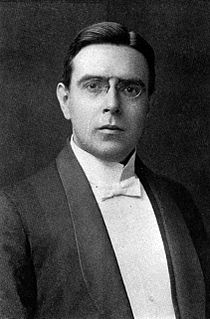Top 3 Quotes & Sayings by Percy Jewett Burrell

Percy Jewett Burrell was an American author and director of historical and civic pageants. Known for his skills in oratory and elocution, he also taught public speaking and drama, and was known as a "public reciter." A native and lifelong resident of the greater Boston area, he was described by Time magazine as a "professional director of civic and patriotic shows." By the mid-1920s, Burrell had developed a nationwide reputation for his work, having had 75,000 participants in his productions, which had collectively been performed in front of over 900,000 people. According to a printed program used at a service in his memory, "His mastery of the spoken and written word led him to be a well known public speaker with an enviable reputation as a teacher of oratory, and later as an author and director of national distinction." Burrell served as the first supreme historian of Phi Mu Alpha Sinfonia Fraternity from 1901 to 1903, and the sixth supreme (national) president of Phi Mu Alpha Sinfonia fraternity from 1907 to 1914, and along with fraternity founder Ossian E. Mills has been credited by fraternity historians with encouraging the early expansion of and formulating the basic ideals espoused by the fraternity. Much of this fundamental philosophy is encapsulated in his presidential messages expounding the fraternity's Object, which appeared in the Sinfonia Yearbooks between 1908 and 1910. Today, these writings are regularly used to instruct the fraternity's probationary members about the fraternity's Object, and the obligations and expectations of fraternity membership.
Related Authors































